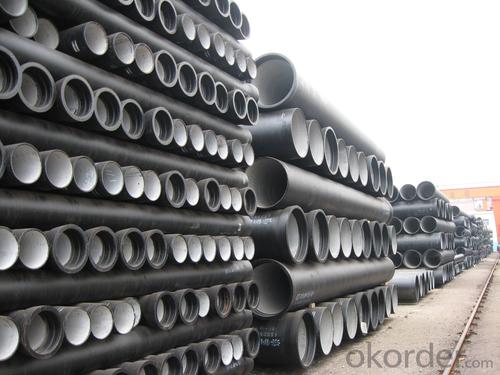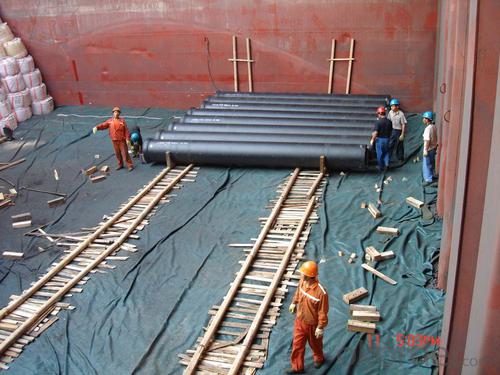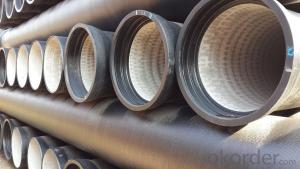Ductile Iron Pipe DN700
OKorder Service Pledge
Quality Product, Order Online Tracking, Timely Delivery
OKorder Financial Service
Credit Rating, Credit Services, Credit Purchasing
You Might Also Like
Specifications
Quick Details
| Place of Origin: | China (Mainland) | Brand Name: | CMAX | Model Number: | T type / K type / Flange type |
| Length: | 6m / 5.7m / Negotiable | Standard: | ISO2531 / EN545 / EN598 | Application: | Potable / Sewage water |
| Diameter: | DN80~DN2200 | Shape: | Round | Hardness: | 230 |
| Pipe Wall Thickness: | standard | Pull Strength: | 420 | Yield (≥ MPa): | 300 |
| Material: | Ductile Iron | Type: | Centrifugal ductile cast iron pipe | Certification: | ISO2531 / EN545 / EN598 |
| Outer Diameter: | 80-2200 | Thickness: | standard | Specification: | DN80~DN2200 |
| |
The advantages to the customer:
Trustworthy financial strength.
One-stop shopping.
Fast and efficient service.
Coordination of shipments from multiple plants.
Specialists of the overseas shipping process.
A more competitive price.
- Q: Are ductile iron pipes resistant to alkali attacks?
- Yes, ductile iron pipes are generally resistant to alkali attacks. The high carbon content and unique microstructure of ductile iron make it highly resistant to corrosion, including attacks from alkali substances.
- Q: How are ductile iron pipes installed?
- Ductile iron pipes are typically installed using the following method. First, the trench is excavated to the required depth and width. The bottom of the trench is then carefully leveled and compacted to provide a stable foundation. Next, a bedding material, usually a sand and gravel mixture, is placed at the bottom of the trench. This bedding material helps to support the pipe and distribute the load evenly. It also serves to protect the pipe from any sharp objects that may be present in the soil. Once the bedding is prepared, the ductile iron pipes are carefully lowered into the trench and aligned to the desired position. It is important to ensure that the pipes are properly aligned and have the correct slope for efficient water flow. After the pipes are in place, they are joined together using a mechanical joint or a push-on joint system. These joints are designed to provide a secure and leak-free connection between the pipes. The joints are typically sealed using rubber gaskets, which help to create a watertight seal. Once the pipes are joined, the trench is backfilled with the excavated soil, taking care to compact it in layers to prevent settlement. The backfilling process is usually done in stages to allow for proper compaction. Finally, the installation is completed by connecting the ductile iron pipes to the existing water supply system or other pipes using appropriate fittings and valves. Pressure testing may also be carried out to ensure the integrity of the installation. Overall, the installation of ductile iron pipes requires careful planning, proper alignment, and secure jointing to ensure a long-lasting and reliable water supply system.
- Q: Are ductile iron pipes suitable for horizontal directional drilling (HDD) installations?
- Yes, ductile iron pipes are suitable for horizontal directional drilling (HDD) installations. They possess the necessary strength and flexibility to withstand the drilling process and can be easily installed underground without compromising their structural integrity.
- Q: What quota can be used for the installation of DN300 ductile iron pipes?
- Moreover, the ball tube is generally 5.5 meters long or 6 meters, if the length of the bridge is too long, to use the casing, the casing must also be fixed, and so on.
- Q: Can ductile iron pipe be used for potable water systems?
- Potable water systems can utilize ductile iron pipe. Ductile iron, a form of cast iron, stands out for its strength, durability, and ability to handle high pressure. It is also resistant to corrosion, making it suitable for water distribution systems. Due to its long lifespan and minimal upkeep requirements, ductile iron pipe is frequently employed in potable water systems. Various standards organizations, such as the American Water Works Association (AWWA), have approved its use in potable water applications. However, it is crucial to adhere to the correct standards and regulations during the manufacturing and installation of ductile iron pipe for potable water systems to guarantee the safety and quality of the water supply.
- Q: How are ductile iron pipes repaired in case of damage?
- Due to their high durability and strength, ductile iron pipes are commonly utilized in various applications. However, like any other materials, these pipes can sustain damage over time due to external influences or internal corrosion. In such instances, there exist several techniques available for repairing ductile iron pipes. One prevalent method is the trenchless repair technique, which allows for the restoration of the damaged section without the need for extensive excavation. This method typically employs specialized equipment to access and repair the affected area. Its advantages lie in minimizing disruption to the surrounding environment and reducing excavation costs. Another approach for repairing ductile iron pipes involves the application of epoxy lining. This process entails the use of epoxy resin to seal any cracks or leaks on the interior surface of the pipe. Epoxy lining is a cost-efficient and effective solution as it provides long-lasting repairs and enhances the overall condition of the pipe. In cases where the damage is severe or extensive, it may be necessary to replace the damaged section of the ductile iron pipe. This typically involves removing the compromised portion and installing a new pipe section. The replacement process may require excavation and can be more time-consuming and costly compared to other repair methods. Nonetheless, it guarantees a comprehensive and permanent solution for the damaged pipe. It is essential to note that the choice of repair method for ductile iron pipes depends on factors such as the extent of the damage and accessibility. Professional assessment and inspection play a crucial role in determining the most suitable repair technique. Consulting experienced pipeline repair specialists or civil engineers is highly recommended to ensure the most effective and durable repair solution for ductile iron pipes.
- Q: How do ductile iron pipes handle ground movement in earthquake-prone areas?
- Ductile iron pipes are designed to withstand ground movement in earthquake-prone areas due to their inherent strength and flexibility. The ductile nature of the iron allows the pipes to deform and absorb the seismic energy without breaking or fracturing. This ensures their durability and ability to maintain water supply and drainage systems even during seismic events. Additionally, ductile iron pipes have superior joint integrity, which further enhances their resistance to ground movement and minimizes the risk of leaks or pipe failure.
- Q: Are there any alternatives to ductile iron pipe for water distribution?
- Yes, there are several alternatives to ductile iron pipe for water distribution. Some common alternatives include PVC (Polyvinyl Chloride) pipes, HDPE (High-Density Polyethylene) pipes, and PEX (Cross-linked Polyethylene) pipes. Each of these alternatives has its own advantages and disadvantages in terms of cost, durability, ease of installation, and resistance to corrosion. The choice of alternative pipe material depends on factors such as the specific requirements of the water distribution system, budget constraints, and local regulations.
- Q: What is the maximum allowable deflection for ductile iron pipes?
- The maximum allowable deflection for ductile iron pipes is typically limited to 2% of the pipe's diameter.
- Q: Do ductile iron pipes require external protection against stray electrical currents?
- Ductile iron pipes indeed necessitate external safeguarding against stray electrical currents. The presence of such currents can induce corrosion in the pipes, resulting in premature failure and probable leakage. To counteract this, protective coatings or wraps are employed on the ductile iron pipes, creating a shield between the pipes and the electrical currents. This safeguarding measure guarantees the durability and dependability of the pipes, warding off expensive repairs and potential safety risks.
Send your message to us
Ductile Iron Pipe DN700
OKorder Service Pledge
Quality Product, Order Online Tracking, Timely Delivery
OKorder Financial Service
Credit Rating, Credit Services, Credit Purchasing
Similar products
Hot products
Hot Searches
Related keywords



























